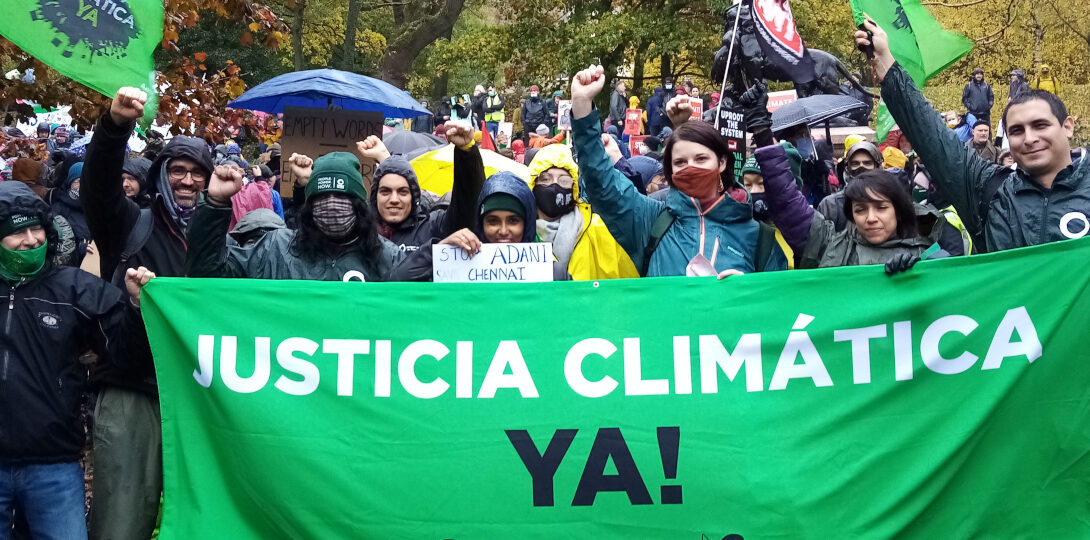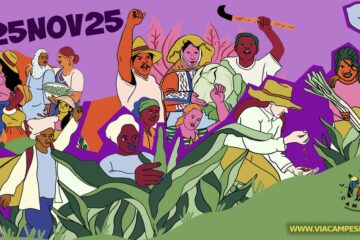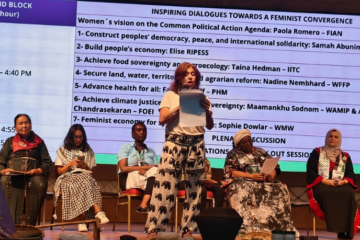Feminist economy is not just a theory — it is a concrete, living political commitment, currently present in many of Friends of the Earth’s struggles. In this presentation, I’ll summarize the reasons why it is important to talk about feminist economy from the perspective of a federation fighting for environmental justice.
First and foremost, because we seek to dismantle patriarchy, because we don’t want to live in an unjust and violent world. We want to transform it, but this transformation cannot happen without challenging patriarchy, nor without questioning capitalism, colonialism, and racism that uphold this system of oppression.
We also speak about feminist economy because we prioritize life and seek to recognize the invisible labor that sustains the care work that makes life possible. We don’t want a system that exploits bodies and territories, but one that upholds a dignified life for everyone.
We believe feminist economy is a political proposal for the systemic change we are fighting for. It is not just a decorative element or a term we name casually — it is a truly cross-cutting issue that we want to explore in depth. We see this perspective reflected in our struggles, which we build together with others. We are not isolated; we form a plural and collective political subject.
We see feminist economy in the construction of a paradigm of life sustainability based on equality — one that places life at the center of care, both for human life and for nature, recognizing that we are interdependent and ecodependent. We also see the principles of feminist economy in the defense of the commons — the shared goods that are essential for collective well-being and must not be commodified.
This also means recognizing and reorganizing domestic and care work as a shared responsibility — not just between women and men, but also among communities and states, through real public policies. Feminist economy also lies in the advancement of care policies and in the reorganization of spaces that promote collective and community-based action.
We see feminist economy in the development of public policies and laws that promote decommodification and a just recovery of life. These are areas in which we, as a federation, take part — advancing the struggle for food sovereignty, defending agroecology, and supporting practices historically led by women. This also means saying no to false solutions based on efficiency, technological fixes, and further commodification.
We also see feminist economy in the call for a just transition — one that limits extractivism and expands decommodification, bringing about real changes in the ways we produce and live within the current system. We also see it in the design of justice systems that do not replicate oppressions and that recognize the citizenship of migrants and the diversity of sexual and gender identities. These are key areas of work that cut across our programmatic lines. And in all of them, feminist economy is present as a political proposal.
So, why does talking about feminist economy in the struggle for environmental justice make us stronger? First, because it strengthens our alliances. Feminist economy is not something isolated, but it is built collectively, in collaboration with women’s movements, labor unions, youth movements, Indigenous peoples, and others. Every time we speak about feminist economy, we are speaking with others.
Feminist economy strengthens our strategies because it allows us to reflect on and recognize what is often rendered invisible, what is frequently overlooked or not accounted for, yet sustains life. It gives us more tools to challenge dominant narratives and build other ways of organizing life. It also strengthens our political coherence.
We often say there is no system change without gender justice. But with feminist economy, we can go further and say: there is no system change — nor gender justice — without changing the economy, power relations, and the ways we produce and reproduce life. Transformation is urgent, and our struggles are deeply connected. When we come together with other movements, when we share not only demands but also political horizons, system change becomes more possible.

Mechi Gould is a member of Tierra Nativa in Argentina and of the Gender Justice and Dismantling Patriarchy working group of Friends of the Earth International. This article is an edited transcript of her speech presented at the webinar “Building Proposals for Feminist Economy and Environmental Justice,” organized by Friends of the Earth International, the World March of Women, Capire, and Real World Radio on July 15th, 2025.




